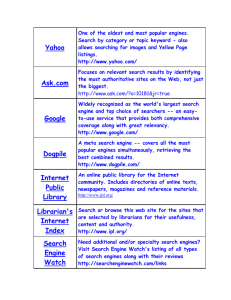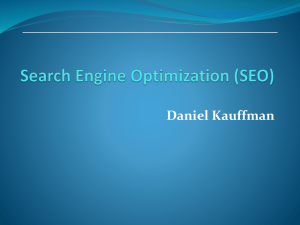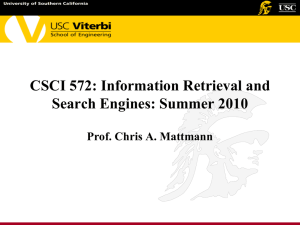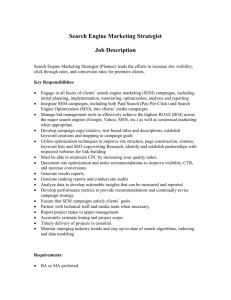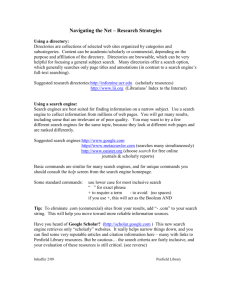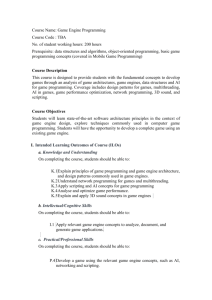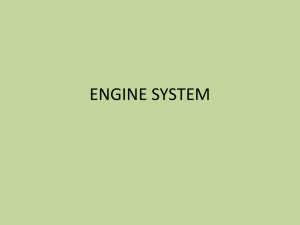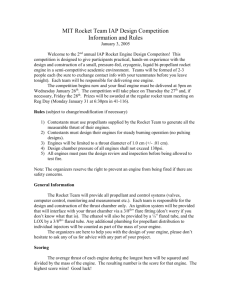Enhancement of Website Visibility using Search Engine
advertisement
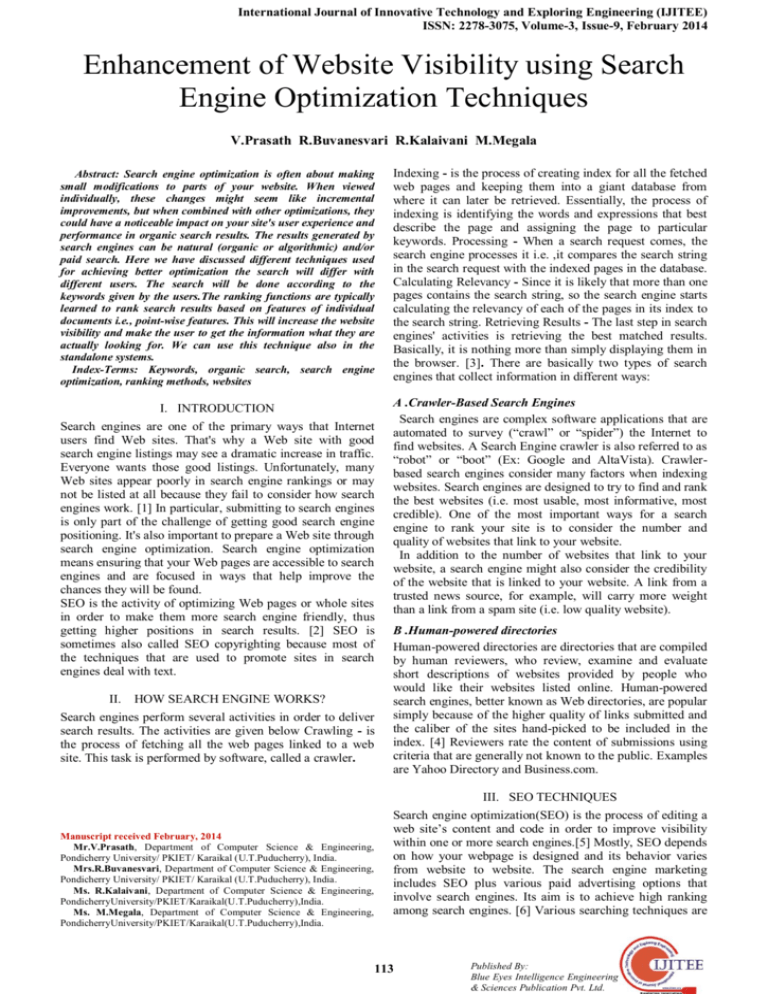
International Journal of Innovative Technology and Exploring Engineering (IJITEE) ISSN: 2278-3075, Volume-3, Issue-9, February 2014 Enhancement of Website Visibility using Search Engine Optimization Techniques V.Prasath R.Buvanesvari R.Kalaivani M.Megala Abstract: Search engine optimization is often about making small modifications to parts of your website. When viewed individually, these changes might seem like incremental improvements, but when combined with other optimizations, they could have a noticeable impact on your site's user experience and performance in organic search results. The results generated by search engines can be natural (organic or algorithmic) and/or paid search. Here we have discussed different techniques used for achieving better optimization the search will differ with different users. The search will be done according to the keywords given by the users.The ranking functions are typically learned to rank search results based on features of individual documents i.e., point-wise features. This will increase the website visibility and make the user to get the information what they are actually looking for. We can use this technique also in the standalone systems. Index-Terms: Keywords, organic search, search engine optimization, ranking methods, websites I. INTRODUCTION Search engines are one of the primary ways that Internet users find Web sites. That's why a Web site with good search engine listings may see a dramatic increase in traffic. Everyone wants those good listings. Unfortunately, many Web sites appear poorly in search engine rankings or may not be listed at all because they fail to consider how search engines work. [1] In particular, submitting to search engines is only part of the challenge of getting good search engine positioning. It's also important to prepare a Web site through search engine optimization. Search engine optimization means ensuring that your Web pages are accessible to search engines and are focused in ways that help improve the chances they will be found. SEO is the activity of optimizing Web pages or whole sites in order to make them more search engine friendly, thus getting higher positions in search results. [2] SEO is sometimes also called SEO copyrighting because most of the techniques that are used to promote sites in search engines deal with text. II. HOW SEARCH ENGINE WORKS? Search engines perform several activities in order to deliver search results. The activities are given below Crawling - is the process of fetching all the web pages linked to a web site. This task is performed by software, called a crawler. Indexing - is the process of creating index for all the fetched web pages and keeping them into a giant database from where it can later be retrieved. Essentially, the process of indexing is identifying the words and expressions that best describe the page and assigning the page to particular keywords. Processing - When a search request comes, the search engine processes it i.e. ,it compares the search string in the search request with the indexed pages in the database. Calculating Relevancy - Since it is likely that more than one pages contains the search string, so the search engine starts calculating the relevancy of each of the pages in its index to the search string. Retrieving Results - The last step in search engines' activities is retrieving the best matched results. Basically, it is nothing more than simply displaying them in the browser. [3]. There are basically two types of search engines that collect information in different ways: A .Crawler-Based Search Engines Search engines are complex software applications that are automated to survey (“crawl” or “spider”) the Internet to find websites. A Search Engine crawler is also referred to as “robot” or “boot” (Ex: Google and AltaVista). Crawlerbased search engines consider many factors when indexing websites. Search engines are designed to try to find and rank the best websites (i.e. most usable, most informative, most credible). One of the most important ways for a search engine to rank your site is to consider the number and quality of websites that link to your website. In addition to the number of websites that link to your website, a search engine might also consider the credibility of the website that is linked to your website. A link from a trusted news source, for example, will carry more weight than a link from a spam site (i.e. low quality website). B .Human-powered directories Human-powered directories are directories that are compiled by human reviewers, who review, examine and evaluate short descriptions of websites provided by people who would like their websites listed online. Human-powered search engines, better known as Web directories, are popular simply because of the higher quality of links submitted and the caliber of the sites hand-picked to be included in the index. [4] Reviewers rate the content of submissions using criteria that are generally not known to the public. Examples are Yahoo Directory and Business.com. III. SEO TECHNIQUES Manuscript received February, 2014 Mr.V.Prasath, Department of Computer Science & Engineering, Pondicherry University/ PKIET/ Karaikal (U.T.Puducherry), India. Mrs.R.Buvanesvari, Department of Computer Science & Engineering, Pondicherry University/ PKIET/ Karaikal (U.T.Puducherry), India. Ms. R.Kalaivani, Department of Computer Science & Engineering, PondicherryUniversity/PKIET/Karaikal(U.T.Puducherry),India. Ms. M.Megala, Department of Computer Science & Engineering, PondicherryUniversity/PKIET/Karaikal(U.T.Puducherry),India. Search engine optimization(SEO) is the process of editing a web site’s content and code in order to improve visibility within one or more search engines.[5] Mostly, SEO depends on how your webpage is designed and its behavior varies from website to website. The search engine marketing includes SEO plus various paid advertising options that involve search engines. Its aim is to achieve high ranking among search engines. [6] Various searching techniques are 113 Published By: Blue Eyes Intelligence Engineering & Sciences Publication Pvt. Ltd. Enhancement of Website Visibility using Search Engine Optimization Techniques involved. They are Ad-hoc search ,Known item search and Named page search. A. Ad hoc search An ad hoc search is one that SEOs are probably the most familiar with, even though we might not know the label for it. With an ad hoc search, the searcher’s goal is to find as many relevant documents as possible about a topic, as the need arises. An ad hoc search is informational in nature, since searcher is on a “fishing expedition” for information about a subject. The searcher might or might not have previous knowledge about the topic but wants to read or learn more about it. B. Known-item search A known-item search is similar to an ad hoc search but the target of the search is a particular document, or a small set of documents, that the searcher knows to exist and wants to find again. In other words, with a known-item search, the searcher knows a particular web page exists but does not always know or remember where it is. C. Named page search With a named page search, the web searcher wishes to go to a specific page within a website, a page that the searcher recalls seeing or visiting at a previous time. [7] As an SEO professional, I often test the effectiveness of site optimization by doing named page searches. D. Social media optimization Social media optimization (SMO) is the process of increasing the awareness of a product, [8] brand or event by using a number of social media outlets and communities to generate viral publicity. V. KEYWORD MANAGEMENT Using keywords correctly throughout a page and a website can be critical when you are trying to improve search engine ranking. The first and most obvious use of keywords during the organic search engine optimization (SEO) process is in the keywords Meta Tag located in the head section of the page's html code. It is also important to consider the use of keywords in headings and anchor text (link text) when you are trying to improve search engine ranking. [11] Using SEO keywords appropriately within headings gives emphasis to the importance of those particular keywords to the theme of the page. Keywords and keyword phrases are important tools in search engine optimization. Keywords are the place to have long tail phrases and words. Long-tail keywords and phrases are those that are esoteric few people will search on any particular one, but having lots of ways for people to get to a blog will pay off in the long run. Analyze Keywords That the Target Audience Will Use within the fields that technical communicators serve, keywords often emerge from the communities of subject matter experts who conduct a field’s research, patent its innovations, and engineer its applications.[12].Common keywords and phrases have long since been claimed, leading webmasters developing new sites to choose domain names based on newly invented brand names or longer key phrases, sometimes rendered readable by hyphens. Apt, keywordrich title boosts a page’s ranking for the matching query, then web developers might reason that repeating the same boilerplate title across their site’s various pages might boost the whole site’s ranking for that query. However, it is generally recommended that each page feature a unique title focused just on that page’s content. VI. HOW RERANKING WORKS? IV. SEARCH RELATED RANKINGS To explain how search engine rankings are directly and indirectly shaped by the three classes of interdependent participants. The three classes of interdependent participants are 1. Search engine companies and programmers 2. Webmasters and SEO practitioners 3. Search engine users. A. Search engine companies and programmers Each search engine company has wittingly or unwittingly programmed its own biases. [9] One study observed that in comparison with their competitors, search engines tended to favor sites and services that their own companies owned, with Google’s SERPs listing Google-owned YouTube more often than its competitors did, and Yahoo listing are more often. B. Webmasters and SEO practitioners Complicating the efforts of search engines to serve what searchers are looking for is the work of webmasters—[10] not all of whom have the motivation, time, communication skills, or technical skills to optimally communicate their web content to search engines. C. Search engine users Web users’ search engine preferences and behaviors, in turn, influence web marketers’ SEO strategies and search engines’ rankings. Showing up on search engines is one of the most critical ways to increase website traffic and expose your content, product or service to people who might be interested in what you have to offer. Most of the major search engines utilize an algorithm to determine where a website ranks. The search engines have set up specific criteria that a website must meet to get to the top of the list. Ranking is used to arrange the website according to their website rank. [13] Website with higher rank will be displayed on the top of the list. Website ranking depends on three factors such as organic, paid and trust-based. A. Organic: Organic search results are listing on search engine results pages that appear because of their relevance to the search terms, as opposed to their being advertisements. In contrast non organic search results may include per pay click advertising. B. Paid: A type of contextual advertising where website owners pay an advertising fee, usually based on clickthrough or ad views to have their website search results shown in top placement on search engine result pages. C. Trust-based: The more popular a site, page or document, the more valuable the information contained therein must be. This assumption has proven fairly successful in practice, as the engines have continued to increase users’ satisfaction by using metrics that interpret popularity. Different sites and pages might focus upon specific topics of interest, such as health or sports, or weather, or construction. A way a search engine might use to try to get around some of the limitations of words with multiple meanings is to assign domain or topical scores to web pages and other 114 Published By: Blue Eyes Intelligence Engineering & Sciences Publication Pvt. Ltd. International Journal of Innovative Technology and Exploring Engineering (IJITEE) ISSN: 2278-3075, Volume-3, Issue-9, February 2014 items found on the Web, regardless of which queries they might be good results for. If you search for the word “cold” and you are using the search box for a health related site, chances are you want to find out something about the illness. If you search for “cold” at Google or Yahoo or Bing, there’s a chance that you might be interested in weather or air conditioning or a cold war or stuffy nose. The patent’s description begins by describing conventional methods of ranking pages in search results. When a search engine attempts to match a query with a document, there are a number of steps that it may go through first. A term-based ranking system like this might also assign scores to web pagses based upon statistics about how frequently query terms appear in documents that contain those terms. A large number of occurrence of the term in a document might increase the score for the document. If there are terms in the query that aren’t on a page, the score for that page may be decreased. If the terms appear in certain parts of a page, such as the page title, the score for the page may be increased. In addition to looking at whether or not a query term appears upon a page for purposes of ranking that page, popularity based ranking signals are often also used in ranking web pages for query terms. These signals can include information about links to pages, looking at which search results people select when seeing a page in search results for a particular query, and others. [3] [4] [5] [6] [7] [8] [9] [10] [11] [12] [13] “Methods for comparing rankings of search engine results” by Judit Bar-Ilan, Mazlita Mat-Hassan, Mark Levene in 2005 “What Users See – Structures in Search Engine Results Pages” by NadineHöchstötter, Dirk Lewandowski in 2008 Search Engine Marketers Professional Organization, SEM Glossary. [Online].Available: http://www.sempo.org/?page=glossary Google. (2010). Search engine optimization starter guide. Webmaster tools help. http://www.google.com/webmasters/docs/search-engineoptimization-starter-guide.pdf B. J. Jansen and P. R. Molina, “The effectiveness of web search engines for retrieving relevant ecommerce links,” Inf. Process. Manage., vol. 42, pp. 1075–1098, 2006. J. Bar-Ilan, “Comparing rankings of search results on the web,” Inf. Process. Manage., vol. 41, no. 6, pp. 1511–1519, 2005. J. Bar-Ilan, M. Mat-Hassan, and M. Levene, “Methods for comparing rankings of search engine results,” Comput. Netw., vol. 50, no. 10, pp. 1448–1463, 2006 http://moz.com/beginners-guide-to-seo/how-search-engines-operate http://en.wikipedia.org/wiki/Search_engine_optimization http://www.webdeveloper.com/forum/showthread.php?278251-5Super-Advantages-of-SEO VII. FUTURE ENHANCEMENT Accordingly, some content creators orient their sites not just to directly attracting and maintaining the attention of their prospective human audiences but to accommodating and even taking advantage of search engines and their ranking rules, to the extent that orienting a site to search engines has become a professional specialty: search engine optimization (SEO). In response, search engines conceal the competition’s rules and frequently redefine them in order to prevent agonistic content creators and their SEO specialists from gaming the system and thereby undermining search engines exclusive logistic roles. Search engine users of course hold the attention economy’s key commodity, their own attention, and confer it not only among the sites of contending web content creators but also among search engines themselves, thereby compelling search engines to try to better accommodate users’ interests. VIII. CONCLUSION The main advantage of SEO is a website can rank high in top search result and from there get a lots of organic traffic that help to generate lead and business. A successful Internet marketing campaign may also depend upon building high quality web pages to engage and persuade, setting up analytics programs to enable site owners to measure results, and improving a site's conversion rate. SEO may generate an adequate return on investment. With Analytics and reporting tools, you’ll see a clear cut increase in traffic. This is a definite way to maximize your business efforts. SEO will give you results (not immediately but rather quickly) and as soon as you start your SEO efforts, traffic will increase. REFERENCES [1] [2] http:\\www.seotutorial.com\\”webmaster”. “Optimization of Ranking Measures “ by Quoc V. Le Smolaa, Olivier Chapelle, ChoonHuiTeo in 2000 Alex 115 Published By: Blue Eyes Intelligence Engineering & Sciences Publication Pvt. Ltd.
